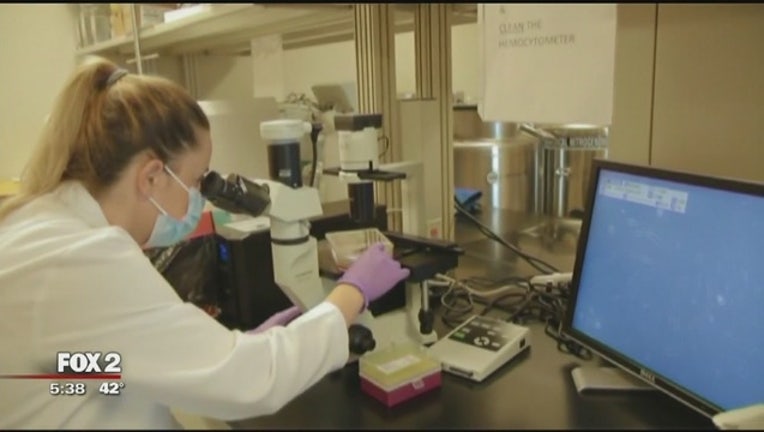Ann Arbor restaurant worker diagnosed with hepatitis A

YPSILANTI, Mich. - Washtenaw County Public Health has issued a warning of possible exposure to hepatitis A.
An employee who works at Cardamom Restaurant at 1739 Plymouth Road in Ann Arbor was diagnosed with hepatitis A. Anyone who ate at the restaurant between September 16 and October 3 may have been exposed.
The individual with hepatitis A infection is not currently working and is receiving medical care.
Washtenaw County Public Health is working closely with the restaurant to vaccinate all employees and to eliminate any additional risk of exposure. Concerned individuals and members of the media are urged to contact Washtenaw County Public Health or their health care provider with questions.
Please do not contact the restaurant. The restaurant owners and employees are cooperating fully with Washtenaw County Public Health, but do not have additional information or health recommendations to provide.
"While hepatitis A can be very serious, we are fortunate to have an effective vaccine available," says Jessie Kimbrough Marshall, MD, MPH, medical director with Washtenaw County Public Health. "We encourage anyone concerned about potential exposure to talk with their health care provider or Washtenaw County Public Health as soon as possible. Vaccination is strongly encouraged for all eligible individuals, as multiple counties in southeast Michigan have seen outbreaks of hepatitis A in recent months."
Hepatitis A vaccine or immune globulin (IG) may provide protection against the disease if given within two weeks of exposure. Anyone potentially exposed to hepatitis should contact their healthcare provider to be assessed for vaccination or IG. Hepatitis A vaccine is available from health care providers, at pharmacies and at Washtenaw County Public Health. People who have had hepatitis A disease or previously received two doses of the hepatitis A vaccine do not need to be vaccinated again.
Monitoring for Symptoms of Hepatitis A
Hepatitis A is caused by the hepatitis A virus, and it can cause damage to the liver and other health problems.
Anyone who has consumed food and/or drink at Cardamom since Saturday, September 16, should monitor for symptoms of hepatitis A including fatigue, poor appetite, stomach pain or tenderness, nausea or vomiting, dark urine, and yellowing of the skin (jaundice). Most children less than 6 years do not experience symptoms. Symptoms typically appear 2 to 6 weeks after exposure. Individuals with symptoms should call their provider or seek care.
Vaccination: The best way to prevent hepatitis A is to get vaccinated. The hepatitis A vaccine is now routinely recommended for children at 1 year of age. Most adults, however, may not be vaccinated unless they did so for travel or other risk factors.
Who should get vaccinated against hepatitis A?
Persons who are homeless.
Persons who are incarcerated.
Persons who use injection and non-injection illegal drugs.
Persons who work with the high risk populations listed above.
Persons who have close contact, care for, or live with someone who has hepatitis A.
Persons who have sexual activities with someone who has hepatitis A.
Men who have sex with men.
Travelers to countries with high or medium rates of hepatitis A.
Persons with chronic liver disease, such as cirrhosis, hepatitis B, or hepatitis C.
Persons with clotting factor disorders.
Any person who is concerned about potential exposure and wants to be immune.
How is it spread?
The hepatitis A virus is most commonly spread from person-to-person by the fecal-oral route. Most infections result from contact with an infected household member or sex partners. Sometimes, infection results from food or drink that is contaminated with the virus. It is not spread through coughs or sneezes. Anyone who has hepatitis A can spread it to others for 1-2 weeks before symptoms appear.
Frequent hand-washing with soap and warm water after using the bathroom and before handling food can help prevent the spread of hepatitis A. Appropriately cooking foods can also help prevent infection. Freezing does not kill the virus.
There have been 341 cases of hepatitis A diagnosed in Southeast Michigan since August 2016, a sixteen-fold increase compared to the previous year. As of October 5, 2017, Washtenaw County has not been identified as a part of this outbreak.
It is not yet known if this currently diagnosed case is related to the outbreak. Learn more about the Southeast Michigan outbreak at www.mi.gov/hepatitisaoutbreak.
Other Sources of Reliable Information
The Centers for Disease Control and Prevention (CDC) www.cdc.gov/hepatitis
Washtenaw County Public Health Fact Sheet: Hepatitis A
Washtenaw County Public Health
Washtenaw County Public Health promotes health and works to prevent disease and injury in our community. Our mission is to assure, in partnership with the community, the conditions necessary for people to live healthy lives through prevention and protection programs.
Washtenaw County Public Health has achieved national accreditation through the Public Health Accreditation Board. Visit us at http://publichealth.ewashtenaw.org or call 734-544-6700. Public Health is located at 555 Towner Street in Ypsilanti. The Environmental Health Division is located at 705 N. Zeeb Road in Ann Arbor and reachable by phone at 734-222-3800.

